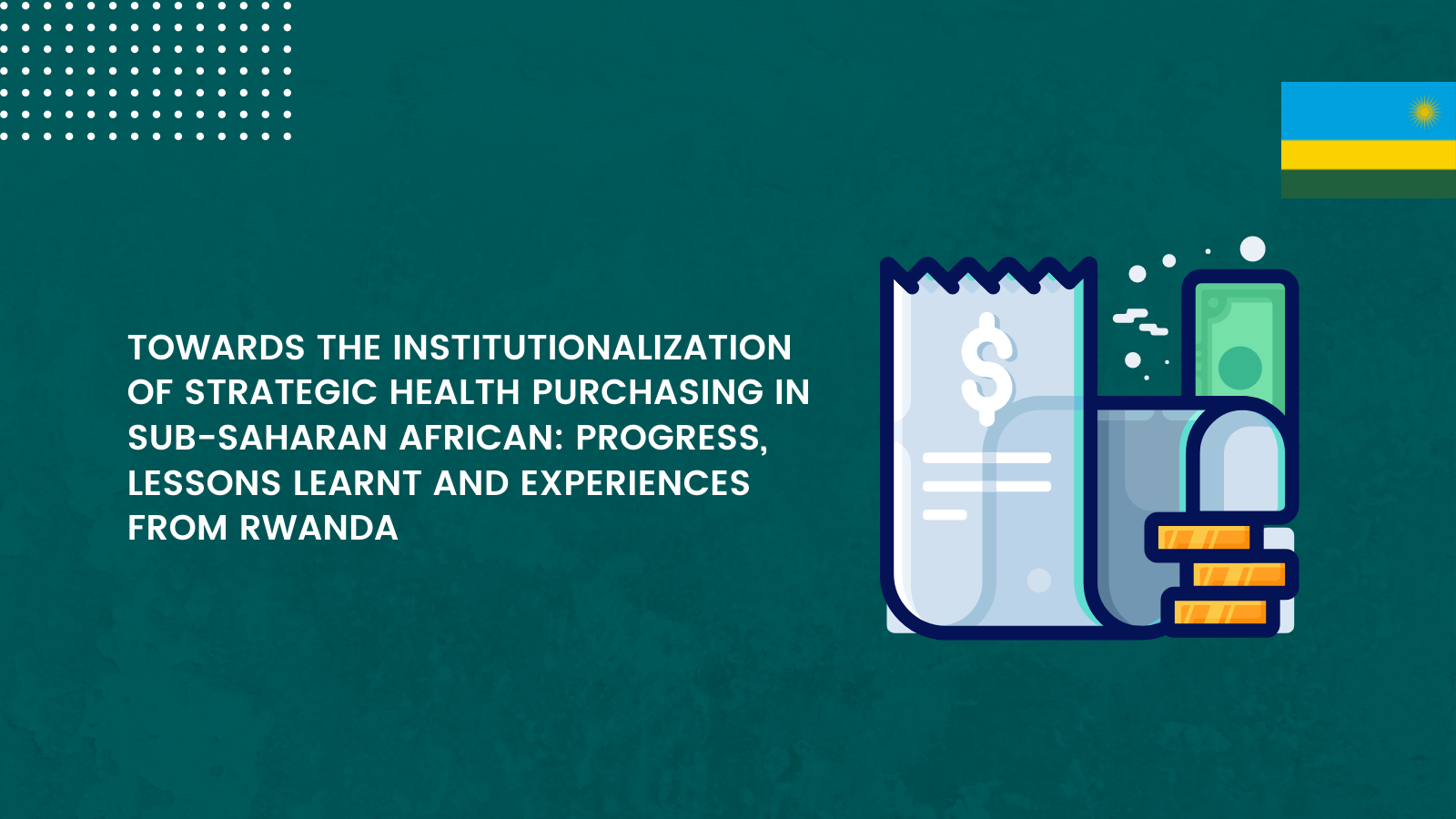Background
Health financing is at the heart and centre of the health system reforms in Rwanda. To attain the goal of Universal Health Coverage (UHC), a health financing system undertakes a series of functions — resource mobilization, pooling and purchasing — to provide health services. Strategic health purchasing emerged as an essential pillar in Rwanda’s Health Financing Strategic Plan 2018-2024 to accelerate and sustain the country’s progress towards UHC and achieve value in health service provision and optimize health system gains.
Strategic Health Purchasing refers to the allocation of resources by one or several purchasing agents to public and private health care providers to provide services. Since available resources are limited, strategic health purchasing aims to maximize health system objectives through an active and evidence-based process. Purchasing reforms in Rwanda have focused predominantly on improving service coverage, establishing legal provisions and governance arrangements, and creating a purchaser-provider split to improve purchasing. In addition, the use of evidence in stakeholder negotiations over purchasing decisions has been essential to respond to the changing needs and preferences of the citizens and achieve value for money.
In 2015, the Government approved the transfer of the management of the Community Based Health Insurance (CBHI) scheme from the Ministry of Health (MOH) to Rwanda Social Security Board (RSSB) to create a purchaser-provider split, increase efficiency in the management of health insurance schemes in Rwanda and reduce administrative costs. This process reduced fragmentation in health financing by merging the 30 district mutuelles into one national CBHI pool. This consolidation of purchasing functions within one institution has created the opportunity to increase RSSB’s purchasing power, although this has not been fully realized. Policy frameworks and regulations exist and are combined with effective oversight and accountability mechanisms and stakeholder engagement through institutional arrangements.
However, some purchasing functions still lie in the MOH, such as reviewing and implementing the benefits package and reviewing provider payment. In addition, there is a need to build the capacities of the purchasing agencies and other actors to ensure adequate stakeholder engagement, create the right incentives for greater efficiency and quality, and monitor providers’ performance.
This blog summarizes key lessons, issues and recommendations emerging from discussions held during a 3-day consultative workshop of policymakers from the MOH, RSSB, academic researchers from the University of Rwanda, College of Medicine and Health Sciences (UR-CMHS/SPH) and strategic purchasing experts and coaches from Strategic Purchasing Africa Resource Centre (SPARC) in October 2020. It also describes the process of establishing the strategic health purchasing sub-technical working group (sub-TWG) to strengthen the institutionalization of strategic health purchasing for UHC in Rwanda.
Stakeholder engagement and dialogue on Strategic Purchasing
In January 2020, the Government of Rwanda, represented by the MOH, the UR-CMHS-SPH, and SPARC, signed a non-binding tripartite Memorandum of Understanding (MOU) outlining the framework for collaboration between RSSB, MoH, UR-CMHS-SPH and SPARC. Since the signing of this MoU, stakeholder engagement has become widely acknowledged as a necessary mechanism for evidence-based decision making and guiding the institutionalization of strategic health purchasing in Rwanda. This recognition led to the organization of a stakeholder engagement workshop in October 2020, which brought together policymakers, purchasers, and academic researchers to discuss the key lessons, opportunities, and challenges to institutionalizing strategic health purchasing.
Key outputs from the workshop were:
- A Theory of Change (TOC) outlining the pathway to achieving progress in strategic health purchasing towards attaining UHC in Rwanda.
- A Partnership Accountability Framework with details proposed activities/projects to achieve the goals of the MOU.
- A review of key findings from the functional mapping of health financing arrangements in Rwanda. Evidence from the mapping formed a baseline analysis of strategic health purchasing in Rwanda, and areas of success and improvement were discussed and agreed upon.
SPARC’s role was to provide templates for the theory of change and partnership accountability framework and facilitate discussions towards consensus between stakeholders. This engagement was conducted in an environment of mutual respect and trust and as the first step towards institutionalization. The engagement led to the first Strategic Health Purchasing sub-technical working group (SHP sub-TWG) in February 2021. This working group will foster cooperation among researchers, policymakers, purchasing agencies, and other stakeholders and support the institutionalization of strategic health purchasing.
Creation of the Strategic Health Purchasing sub-technical working group to strengthen and institutionalize strategic health purchasing
The SHP sub-TWG aims to support Rwanda, identify how to strengthen strategic purchasing for UHC, support the institutionalization of strategic health purchasing, contribute to implementing the Health Financing Strategic Plan, support policy dialogue and enhance the accountability of providers and purchasers to the population. Members of the SHP sub- TWG include government officials, purchasing agencies, representatives of healthcare providers, health professional associations, civil society organizations, academia and development partners. The SHP sub-TWG is chaired by the MOH- Head of Department of Planning, Health Financing and Monitoring and Evaluation, and co-chaired by RSSB Deputy Director-General in charge of Benefits. At the same time, the UR-CMHS-SPH and the Rwanda Integrated Health Systems Activity (RIHSA) are responsible for secretariat functions.
The proposed SHP sub-TWG terms of reference facilitate policy reforms and dialogue on strategic health purchasing to successfully implement the Health Financing Strategic Plan 2018-2021 and achieve UHC by focusing on four key pillars of strategic purchasing: provider payment, benefits package design, governance arrangements and information management.
Since its inception, the SHP sub-TWG has worked on three projects: (1) guidelines for CBHI scheme reimbursement of donated medical products, (2) a concept note to inform decision-makers on the need to refine and review existing provider payment mechanisms at the primary healthcare (PHC) level to purchase PHC strategically and incentivize efficiency and quality health service delivery, and (3) the lean health care initiative.
Currently, the provider payment at the PHC level includes: (1) a mix of line-item budgeting for staff salaries, medicines, and facility infrastructure, (2) Fee-For-Service (FFS) from CBHI and other insurance schemes and (3) performance-based financing (PBF) based on specified qualitative and quantitative performance indicators. Each of these provider payment mechanisms creates different incentives and behaviour that can affect health outcomes and delivery. FFS, the predominant reimbursement mechanism from CBHI and insurance schemes, pays providers for each service unit provided regardless of quality, outcomes, or efficiency. Capitation was proposed and promoted as an alternative provider payment mechanism at the PHC level to address the challenges associated with lengthy claims verification and reimbursement delays to health facilities and contribute to cost containment and efficiency gains. Data collection and analysis are ongoing to inform the design of the capitation model drawing on global evidence and the local context.
The capitation model design, legal framework review, monitoring and evaluation matrix and communication strategy are being developed by the same sub-TWG.
Conclusion and lessons learnt
Rwanda has launched bold reforms and initiatives towards strategic health purchasing. Although Rwanda is unique in several ways, the lessons learned institutionalizing strategic health purchasing could be relevant to other countries. Rwanda’s experience shows that taking advantage of the windows of opportunity for institutionalizing strategic health purchasing is essential while considering political economy factors. In the case of Rwanda, the transfer of the management of the CBHI scheme from the MOH to RSSB, and the creation of a separate SHP sub-TWG for policy dialogue, presented windows of opportunity for strategic purchasing to accelerate and sustain progress towards UHC and get more value from the money invested in the health sector. To maintain Rwanda’s progress in strategic health purchasing, there is a need to enhance the capacity for strategic health purchasing across all stakeholders and ensure that all stakeholders involved in the purchasing of healthcare come together through a consultative process to define a common framework to categorize, track, and document and continuously improve purchasing functions and activities.
List of references
- Glassman A, Giedion U and Smith PC. What’s In, What’s Out: Designing Benefits for Universal Health Coverage – Key Messages for Donors and Advocates. 2017, 6:1864.
- https://globalizationandhealth.biomedcentral.com/articles/10.1186/s12992-018-0345-x
- https://www.who.int/healthsystems/universal_health_coverage/en/
- Ministry of Health (2019). Rwanda Health Financing Strategic Plan (2018-2024), Kigali, Government of Rwanda.
- Rwanda Social Security Board, “Community Based Health Insurance Annual Report, Fiscal Year 2017-18.” Kigali – Rwanda, 2018.
AUTHORS

Alypio Nyandwi is a public health professional with experience in public policy analysis, planning, research, monitoring and evaluation. Alypio has over 15 years of working experience in Rwanda’s health sector, where he has worked with both governments and non-governmental organisations at the international level.

Stella Umuhoza is a lecturer and researcher at the University of Rwanda School of Public Health (UR/SPH) in the Department of Health Policy, Economics and Management. She has over ten years of experience working in public health systems. Currently, she serves as a member of the Community-Based Health Insurance (CBHI) Consultative Group and Health Financing Core Group in Rwanda. Stella recently developed Rwanda’s Health Financing Strategic Plan for 2018-2020 and the Family Planning (FP) investment case. Over the years, she has provided technical assistance to various government institutions and international organizations in developing policy documents and briefing notes to inform decision-making.

Dr Parfait Uwaliraye is the Director-General for Planning, Monitoring and Evaluation and Health Financing at the Ministry of Health in Rwanda, a position he has held since November 2012. Dr Uwaliraye is a medical doctor with a Master’s degree in Public Health. He worked as a Research Assistant, a District Medical Officer and the director of Kibagabaga District Hospital prior to joining the Ministry of Health. He has a particular focus on health policy, planning, health financing, private sector engagement and global health.

Sabine Musange F. is a lecturer and currently head of the Health Policy, Economics and Management department at the School of Public Health, University of Rwanda. With a background in both medicine and global health research, her research interests focus on strengthening health systems in low-resource settings. Previous work includes program evaluation in maternal and child health, health systems and financing. Most of her work has been carried out in low-income settings and she is passionate about women and child’s health and above all about improving population health.

